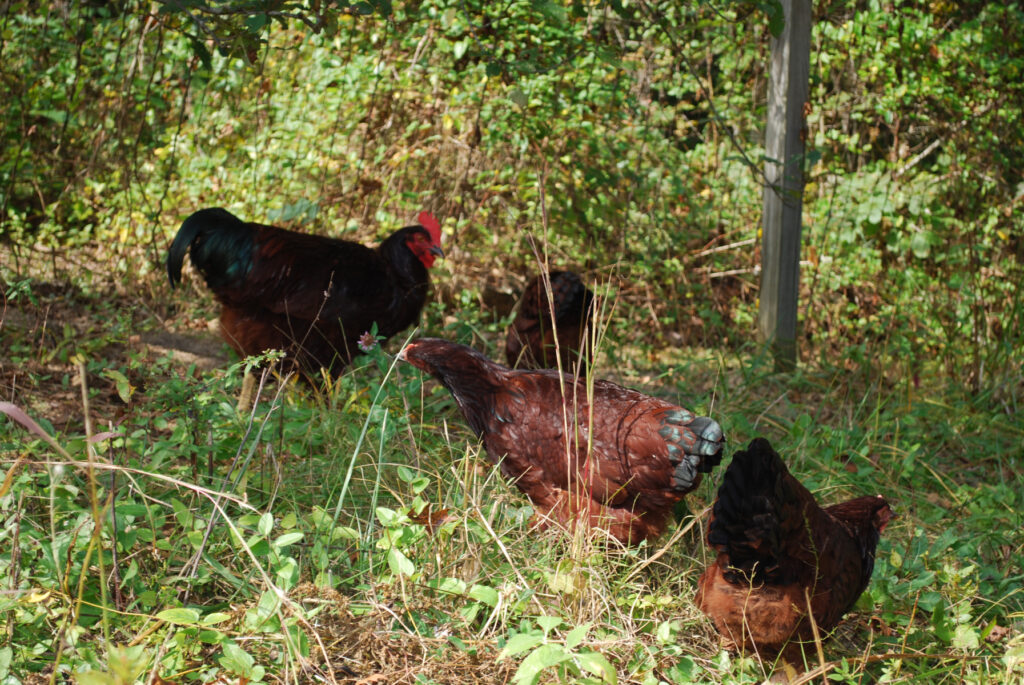
One of the most fascinating aspects of raising chickens is observing how they react to their world … especially the foods they seek out, the ones they’ll sometimes eat, and the menu items they ignore. Here are my observations from tossing food into the run and from watching our birds free-range in the yard.
Wild Creatures and Plants Chickens Relish
Hands down, our chickens display more excitement about locusts than any other flora or fauna. Our chooks eagerly ravage annual, 13-year, and 17-year cicadas. The only times I’ve heard our birds “whine” to be released from their run is when the cicada hatch has peaked. And the only times I’ve seen our birds so stuffed with food that they couldn’t scarf down anything else is after I’ve let them out to plunder cicadas.
Grasshoppers and crickets rank right behind cicadas on the popularity scale. I think it’s partly because both creatures feature large, protein- and calorie-rich bodies, but it may also be because hoppers and crickets try to flee, which perhaps triggers the predatory instinct in chickens.
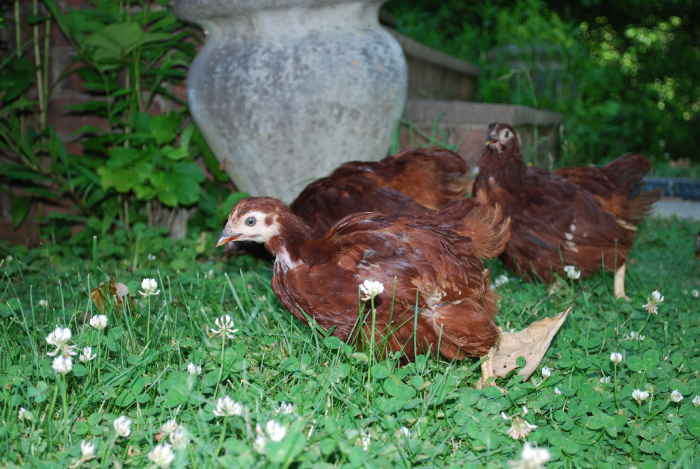
Chickens are natural foragers, and no plant is more appealing to them than clover. My birds will seek it out as soon as it emerges in the spring. Every year, I cordon off an area of the chicken run and plant clover there. Then, after three weeks and several rains, I open the area and let my chickens feast for several days before they strip every bit of the greenery bare.
Dandelions are another delicacy, especially in the spring when the young plants are particularly tender. Chickweed is another favorite; why wouldn’t it be with a name like that?
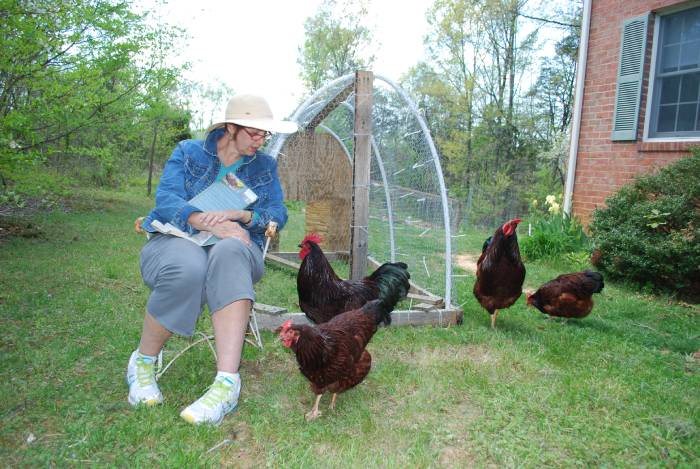
Wild Creatures and Plants Chickens Also Eat
From my experience, chickens possess a number of secondary favorites, as well as some items that seem to be individual preferences. Japanese beetles appear every summer, and when I toss them into the run, my chooks will attack them, but not with the frenzy they approach locusts, grasshoppers, and crickets.
Worms are another matter altogether. I once had a hen, Ruby, who relished night crawlers, red wigglers, and their ilk. Yet, while Ruby was pulling worms out of the holes on wet, rainy forays, the other birds were content to let her do so and strolled right by the writhing creatures. With chickens, worms seem to be an acquired taste. Is it possible they taste good to some birds but not to others?
The same sentiment may well hold true with ants. I’ve observed some birds eagerly pecking at them while other flock members display disinterest. The one exception is when I split wood for our wood stove in the winter. If I place a chunk of carpenter ant-riddled wood in the run, every bird will intensely peck at and devour the cold-benumbed creatures.
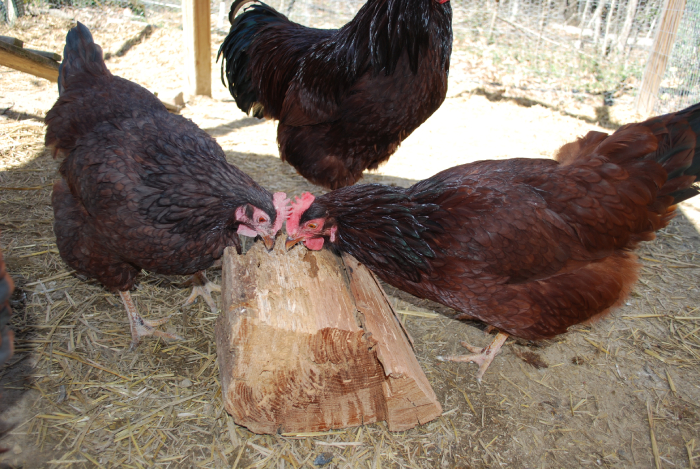
The same ambivalence appears to apply to caterpillars, as well. I’ve observed chickens charge toward caterpillars, then pull up short when they saw what they were. Other times, only a bird or two will show interest in this insect. Then, one bold bird will peck at the caterpillar until it dies and eat all or part of it. Chickens are pretty good at avoiding toxic insects. One thing that appears constant about caterpillars is that my birds won’t consume ones that are overly “hairy.”
Chickens can display that same indifference to three common yard plants. Fescue is omnipresent in many American yards, and sometimes, my birds snip it off eagerly; other times, they’ll walk right by it on their way to other menu items. Broadleaf plantain and bittercress (a close relative to watercress) engender similar reactions.
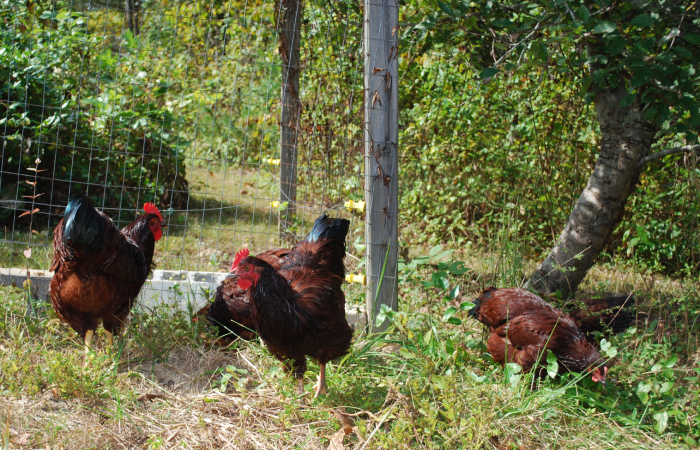
Chickens eagerly shred a plantain leaf in early spring but will only nibble at one a few months later. Bittercress is very popular with my birds when it appears in late winter but not so much by mid-spring. I believe these plants become tougher as the year progresses, which could explain my chickens’ reactions.
I’m Not Eating That Stuff
I’ve endured Lyme disease, and I’m extremely afraid of all species of ticks. So, when I’ve encountered a dog, black-legged, lone star, or any other species of these arachnids, I’ve offered them to my birds — and none of them have ever lowered themselves to consume one. Who knows why?
The same holds true concerning wasps and slugs. I’ve tried feeding my birds various species of wasps (dead, dying, or alive), and they seem afraid of them. Are they instinctively aware of the stingers?
I know that ducks are big fans of slugs. But I’ve tossed several slugs into my chicken’s enclosure and watched them run toward this potential prey item … and then casually stroll in the opposite direction.
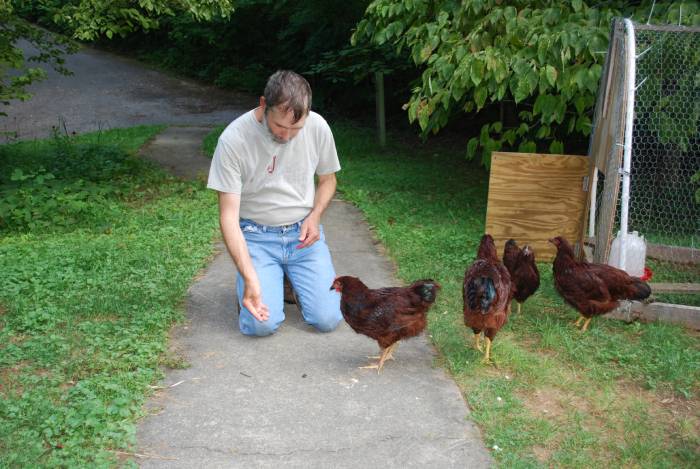
items. Notice the indifference in this photo. by Bruce Ingram
Chickens may relish chickweed, but they don’t feel the same about hen penny, also known as ground ivy. I’ve often observed birds nipping a few slivers of ground ivy and then letting the rest drop to the ground. I have a real problem with ground ivy in my yard and garden, and I dearly wish that my chooks would give me a little help in controlling it, but they simply won’t.
In late autumn every year, I let the chickens forage in our garden area, and, fortunately, they won’t eat the strawberry plants. Chickens will zealously ravage strawberries but show no interest in the greenery. The same applies to the lemon balm in our garden and chicken run. I planted this balm because it’s supposed to be a fly repellent. It also apparently repels chickens from consuming it.
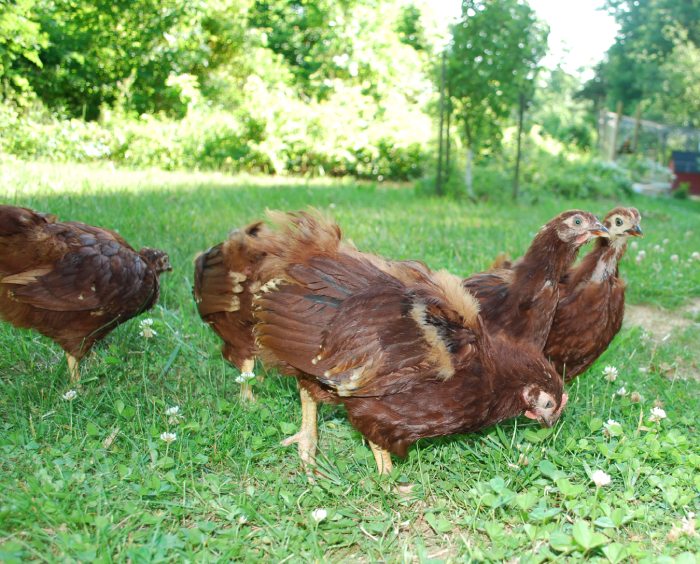
to others. by Bruce Ingram
Chickens are endlessly captivating creatures that never cease pleasing and puzzling us. That same fascination and befuddlement also apparently applies to what they will — and won’t — eat.
Bruce Ingram is a freelance writer and photographer. He and wife Elaine are the co-authors of Living the Locavore Lifestyle, a book about living off the land. Get in touch with them at BruceIngramOutdoors@gmail.com.
…
backyardpoultry.iamcountryside.com
Feed Name : Backyard Poultry
Chickens 101,chicken treats,edible-crickets
hashtags : #Wild #Edibles #Chickens






Leave A Comment